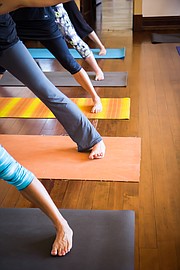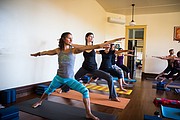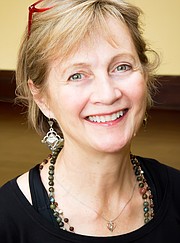Ask The Expert - The Benefits Of Yoga
The Expert: Karen Sprute-Francovich founded Coeur d’Alene’s Garden Street School of Yoga in 2001, and has steadily grown it into a thriving community of local teachers and practitioners. The studio offers several yoga and meditation classes for different demographics and skill sets, including a beginner’s course that aims to teach core practices and create a strong foundation in yoga.
Sprute-Francovich has an extensive background in yoga, including an M.A. from Gonzaga, Certified Anusara Yoga Teacher (2001), Certified Anusara Advanced Teacher Trainer (CATT); E-RYT-500 & YACEP. She previously worked as a body work therapist and Chinese medicine practitioner, and was the co-owner of the Wellspring Center for East Asian Movement and Healing Arts in Boise.
Live Well asked Sprute-Francovich about her studio, the health benefits of yoga and how beginners can get started.
LIVE WELL: What are some of the health benefits associated with yoga?
SPRUTE-FRANCOVICH: Yoga warms and enhances circulation, improves breathing, increases both strength and flexibility, reduces stress and brings a sense of well-being that extends beyond the practice. Research corroborates these positive benefits and confirms what ancient Yogis said: Yoga and meditation make you smarter, stronger, kinder and happier.
I’ve been doing yoga regularly since I was 16 and teaching for 36 years. The positive effects of yoga have touched every part of my life.
LIVE WELL: What is involved in one of your beginner yoga classes? What are some of the basics for getting started?
SPRUTE-FRANCOVICH: Our Absolute Beginners and Basic classes focus on fundamental poses and principles of alignment that free up major joints, increase circulation, lengthen and strengthen the main muscle groups and connective tissue continuities of the body. Also, in our basic classes we teach simple breath awareness and basic breathwork techniques.
If people are interested, you can email us and we’ll find a class that fits your schedule. Or you can find class descriptions, schedules and prices on our website. We ask people to let us know what class they plan to attend for their first class, so the teacher knows to expect a new student. We prefer that people have their own mats, but we do have a few loaners to get people started.
3. What is your process for meditation that you share with students?
SPRUTE-FRANCOVICH: We focus, first and foremost, on helping people become comfortable physically. We teach meditation postures that will allow them to be relaxed in a seated position. Meditation doesn’t necessarily mean you have to sit on the floor. Some students use chairs, and some lie on their backs depending on their needs. From there we teach various inward focusing techniques to help people withdraw (temporarily) from their busy lives, big to-do lists, scattered thoughts and often anxiety-driven emotions.
We suggest various inner points of focus, but in general we always use breath. For example, we might say “bring your attention to your breath, and let your mind ride on the swing of your breath.”
Our meditation focus is on the body and being able to live and work in our bodies more coherently and comfortably. Advanced yoga classes and our Anusara Yoga Immersion program focus more on the philosophy and meaning of meditation, all built on a basic foundation of physical integrity and coherence.
LIVE WELL: Are there simple yoga exercises people can do from home?
SPRUTE-FRANCOVICH: Really, I think people need to come to class to learn yoga practices. A good teacher and a good class make all the difference between a person finding the benefits of yoga – or not. Then they can practice at home.
But here is one (of many) simple mediation or grounding practices that people can do anywhere:
“Place your attention in the soles of your feet. Press down and feel your connection to gravity. Once you feel that connection, relax your lower belly. Next, imagine breathing into and out from the soles of your feet for several breaths.”
LIVE WELL: How does a live class compare to a self-directed yoga regimen from home?
SPRUTE-FRANCOVICH: I know from experience that it is best to learn these practices from an experienced teacher. But once that has happened, then yes, you can add in home practice.
There are many good online resources. But it is quite common for people to try them and not continue. Having a real live teacher, who is well-trained and dedicated to helping you learn and deepen into the practices makes a huge difference.
And of course, you will have questions. And a live teacher will be able to answer them or at least direct you to where you can find an answer.
LIVE WELL: What are some advantages to the social experience of attending a class?
SPRUTE-FRANCOVICH: Being with other yoga and meditation practitioners is very important. We call it “practicing in good company.”
Some classes are more social than others; some quieter. Some people are drawn to the quieter classes. Some to the more social. People tend to find their way to their “home class’ and then they can couple that class with their home practice. But all the classes end up guiding students more inward, more to the home of their own body and breath. That’s one of the hallmarks of good yoga versus just a good workout.
LIVE WELL: What are some health restrictions for yoga and does it depend on the skill level?
SPRUTE-FRANCOVICH: We are cautious and careful with beginners. Our studio has a big mission to welcome everyone, especially beginners. We want to get them safely started in yoga so that they will be more likely to fall in love with it.
In practical terms, we ask that everyone be able to walk up a flight of stairs, because our studios are on the second floor. So that makes our classes not appropriate for people in wheelchairs or with major disabilities. We refer people with major disabilities to professional medical providers.
For more advanced classes, we have prerequisites. Although there are some exceptions, in general we only admit students who have been coming to class at Garden Street for a minimum of two years and who know the Anusara Yoga principles of alignment that we teach here and how to apply them to their poses. We require that they be able to perform a full back bend as well as a handstand at the wall. These prerequisites keep them safe.
LIVE WELL: Is there anything else you’d like people to know about the benefits and appeal of yoga and meditation?
SPRUTE-FRANCOVICH: Yoga and meditation are time-proven and evidence-based practices that connect body, heart, and mind. Try it. We think you’ll like it.
- • •
Garden Street School of Yoga is located at 602 E. Garden Street in Coeur d’Alene. Visit the website at www.GardenStreetYoga.net for much more information as well as details on classes. You can also call (208) 660-9746 or email Karen@GardenStreetYoga.net







